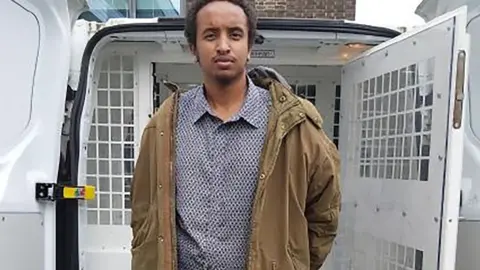Prevent counter-terror scheme lambasted in review

 Metropolitan Police
Metropolitan PoliceThe UK's scheme to prevent terrorism has "apparently failed" repeatedly to identify attackers, a highly critical review has concluded.
The report from the Home Office's hand-picked reviewer says the Prevent strategy has lost its way.
William Shawcross said the nationwide system that aims to identify would-be terrorists has funded a group whose head was sympathetic to the Taliban.
Home Secretary Suella Braverman told MPs that Prevent needs major reform.
Prevent is a key part of the UK's counter-terrorism strategy. In practical terms, it places public bodies, including schools and the police, under a legal duty to identify people who may turn to extremism, and intervene in their lives before it is too late.
If the local panels find someone who is at risk of becoming a terrorist, the Prevent teams use specialist mentors or other support programmes to turn around their lives.
In 2021, ministers asked Mr Shawcross, a former chairman of the Charity Commission and well-known critic of Islamist political influence in Europe, to review Prevent amid mounting concerns about its effectiveness.
In the report, Mr Shawcross said Prevent had helped some people disengage from terrorism.
But he added: "Despite this, all too often those who commit terrorist acts in this country have been previously referred to Prevent.
"Prevent apparently failed to understand the danger in these cases, and this review demonstrates how such failures might be avoided in the future.
"Prevent must return to its overarching objective - to stop individuals from becoming terrorists or supporting terrorism."

Funding wrongly targeted
Mr Shawcross said he had been consistently unable to determine how many community organisations receiving a slice of the £49m Prevent budget were having any impact.
"Funding too often goes towards generic projects dealing with community cohesion and hate crime, and few [community organisations] could be seen publicly to contest extremist discourse.
"Some have promoted extremist narratives, including statements that appear sympathetic to the Taliban.
"As a core principle, the government must cease to engage with or fund those aligned with extremism."
And he added: "Prevent's first objective - to tackle the causes of radicalisation and respond to the ideological challenge of terrorism - is not being sufficiently met. Prevent is not doing enough to counter non-violent Islamist extremism."

Preventing terrorism?
- Lewis Ludlow: Prevent teams spent a decade trying to work with him. He later played along - but security services later caught him plotting a bomb attack
- Ali Harbi Ali: Murdered Sir David Amess MP in 2021 - told his trial he had tricked Prevent specialists
- Ahmed Hassan: Planted bomb on London Underground in 2017, a year after he had been flagged for deradicalisation
- Alex Davies: Founder of National Action group was known to Prevent from the age of 16

While eight out of 10 plot investigations were linked to Islamist causes, less than a fifth of Prevent's caseload was in the same area, he said. Too often, he argued, there was "a culture of timidity" when it came to tackling Islamism.
He also warned that Prevent was burdened with dealing with people who should be receiving alternative support from mental health services.
'Major reform' promised
The review's 34 recommendations include clarifying Prevent's objectives, including stopping funding going to Islamist groups or others not directly involved in counter-extremism work.
Speaking to MPs, Ms Braverman said she would implement all the recommendations and report back next year.
"The review is unflinching. Prevent needs major reform," she said.
"Prevent has shown cultural timidity and an institutional hesitancy to tackle Islamism for fear of the charge of Islamophobia. Prevent's focus must be solely on security, not political correctness."
Author criticised
Mr Shawcross's appointment was criticised by a range of civil rights campaign groups, including some involved in Muslim or Islamist political causes who accused him of having anti-Islamic views - and they launched their own rival review that says Prevent is discriminatory.
Brendan Cox, whose wife Jo Cox MP was murdered by an extreme right-wing attacker, said he had concerns about the review's conclusions.
"The Shawcross review risks damaging the programme instead of strengthening it," he said.
"Given his pre-existing outspoken views on Islam, his conclusion that we should focus on Islamists and less on the far right looks like bias not insight.
"It will be used by Prevent's opponents to 'prove' its supposed anti-Muslim slant. This review is a missed opportunity."
And Labour's shadow home secretary Yvette Cooper said: "Counter-terror police and experts need to be able to follow the evidence on all kinds of terrorist and extremist threats, including Islamist, far right and other new and growing threats.
"So it is counter-productive for the home secretary to try and create a hierarchy of extremism, or pit different kinds of extremism against each other, when all of them need to be fiercely challenged without fear or favour.
"Labour is calling for a new wider counter-extremism strategy to include tackling hateful extremism and countering radicalisation online, in prisons and wherever it is found. Today's review fails to do that."
